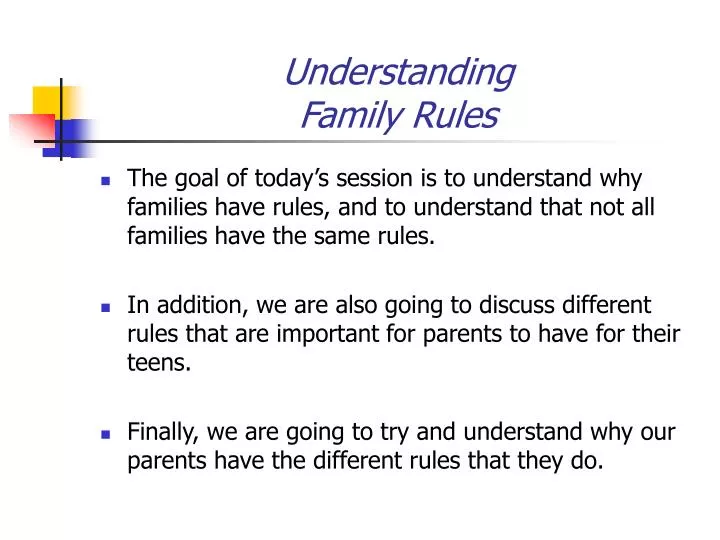Understanding The Rules: A Comprehensive Guide To Mastering Life's Guidelines
In today's fast-paced world, understanding the rules is more crucial than ever. Whether it's societal norms, professional regulations, or personal guidelines, knowing the rules empowers you to navigate life with confidence and clarity. This article dives deep into the importance of understanding rules and how they shape our lives.
From the workplace to relationships and even personal growth, rules act as frameworks that guide behavior and decision-making. They provide structure and help maintain order in an otherwise chaotic world. In this guide, we will explore the significance of understanding the rules and how they impact various aspects of life.
By the end of this article, you will gain a deeper appreciation for the role of rules in shaping our daily experiences. Let's embark on this journey to uncover the hidden power of rules and how they can transform your life.
Read also:Gary Desorbo The Unsung Hero Of Modern Entertainment
Table of Contents
- The Importance of Understanding the Rules
- Types of Rules in Everyday Life
- Benefits of Knowing the Rules
- Challenges in Understanding the Rules
- Understanding the Rules in the Workplace
- Rules in Personal Relationships
- The Role of Rules in Education
- Societal Rules and Their Impact
- Legal Rules and Regulations
- Creating Personal Rules for Success
The Importance of Understanding the Rules
Why Rules Matter
Rules serve as the foundation of any organized system. They provide clarity, reduce ambiguity, and ensure fairness. By understanding the rules, individuals can make informed decisions and avoid unnecessary conflicts. In professional settings, knowing the rules can enhance productivity and foster a positive work environment.
Research from Harvard Business Review indicates that organizations with clear guidelines experience higher employee satisfaction and better performance outcomes. This underscores the importance of understanding the rules in both personal and professional contexts.
Types of Rules in Everyday Life
Classifying the Rules
Rules come in various forms, each serving a unique purpose. Below are some common types of rules:
- Social Rules: Governing interpersonal interactions and societal norms.
- Legal Rules: Enforcing laws and regulations to maintain public order.
- Professional Rules: Outlining workplace policies and ethical standards.
- Personal Rules: Self-imposed guidelines for personal growth and development.
Understanding the nuances of these rules can help you adapt to different situations and environments.
Benefits of Knowing the Rules
Knowing the rules offers numerous advantages, including:
- Improved decision-making abilities.
- Enhanced problem-solving skills.
- Increased confidence in navigating complex situations.
- Better conflict resolution capabilities.
A study by Stanford University highlights that individuals who understand the rules are more likely to succeed in their personal and professional lives. This is because they can anticipate challenges and develop effective strategies to overcome them.
Read also:Minister Of Communications And Digital Technologies Fights For Creators To Get Paid By Tiktok
Challenges in Understanding the Rules
Overcoming Barriers
While understanding the rules is essential, it is not without its challenges. Some common obstacles include:
- Complexity: Rules can be intricate and difficult to comprehend.
- Change: Rules are subject to change, requiring constant adaptation.
- Cultural Differences: Rules may vary across cultures, leading to misunderstandings.
To overcome these challenges, it is crucial to stay informed and seek clarification when needed. Engaging with experts and consulting reliable sources can also help bridge knowledge gaps.
Understanding the Rules in the Workplace
In the workplace, understanding the rules is vital for career success. This includes adhering to company policies, respecting hierarchical structures, and maintaining professional ethics. By mastering workplace rules, employees can enhance their productivity and contribute positively to the organization.
Key Workplace Rules
- Time Management: Meeting deadlines and maintaining punctuality.
- Communication: Practicing effective and respectful communication.
- Team Collaboration: Working harmoniously with colleagues and supervisors.
According to a report by McKinsey, companies that prioritize rule clarity and adherence experience a 20% increase in employee engagement. This demonstrates the importance of understanding workplace rules for organizational success.
Rules in Personal Relationships
Building Stronger Connections
In personal relationships, rules play a crucial role in fostering trust and mutual respect. These rules may include boundaries, communication guidelines, and shared responsibilities. By understanding and respecting these rules, individuals can build stronger, more meaningful connections.
For example, setting clear expectations in a relationship can prevent misunderstandings and conflicts. This involves discussing topics such as finances, family involvement, and future goals. By establishing and adhering to these rules, couples can create a solid foundation for their relationship.
The Role of Rules in Education
In the realm of education, rules provide structure and promote learning. They ensure that students and educators adhere to ethical standards and maintain a conducive learning environment. Understanding educational rules can enhance the learning experience and lead to better academic outcomes.
Examples of Educational Rules
- Attendance Policies: Ensuring regular participation in classes.
- Academic Integrity: Preventing plagiarism and upholding honesty.
- Examination Guidelines: Following procedures during assessments.
Research from the National Education Association reveals that schools with clear rules and regulations report higher student performance and lower dropout rates. This highlights the critical role of rules in the educational sector.
Societal Rules and Their Impact
Shaping Society
Societal rules govern behavior and promote harmony within communities. They address issues such as public safety, environmental protection, and cultural preservation. By understanding societal rules, individuals can contribute positively to their communities and foster social cohesion.
For instance, traffic laws ensure road safety, while recycling regulations promote environmental sustainability. These rules not only protect individuals but also benefit society as a whole. By adhering to societal rules, we create a safer, more equitable world for everyone.
Legal Rules and Regulations
Legal rules and regulations are essential for maintaining order and justice in society. They define rights and obligations, resolve disputes, and enforce penalties for violations. Understanding legal rules empowers individuals to protect their rights and fulfill their responsibilities.
Key Legal Concepts
- Contract Law: Governing agreements between parties.
- Criminal Law: Addressing offenses against society.
- Family Law: Regulating matters such as marriage and custody.
According to the United Nations, adherence to legal rules is a cornerstone of democratic societies. It ensures that all individuals are treated equally under the law and have access to justice.
Creating Personal Rules for Success
Developing Your Own Guidelines
While external rules provide structure, personal rules allow you to define your own path to success. By creating and following personal rules, you can achieve your goals and lead a fulfilling life. Below are some tips for developing effective personal rules:
- Set Clear Objectives: Define what you want to achieve.
- Stay Consistent: Adhere to your rules consistently.
- Review and Adjust: Periodically evaluate and refine your rules.
Personal rules can enhance self-discipline and motivation, driving you toward your desired outcomes. By mastering the art of rule creation, you can unlock your full potential and live a purposeful life.
Conclusion
In conclusion, understanding the rules is essential for navigating life's complexities. From workplace regulations to personal guidelines, rules provide the framework for success and fulfillment. By embracing the principles discussed in this article, you can enhance your ability to understand and apply rules effectively.
We invite you to share your thoughts and experiences in the comments section below. Your feedback is invaluable in helping us improve and expand our content. Additionally, feel free to explore other articles on our site for more insightful reads. Together, let's continue to grow and thrive in a world governed by rules.


